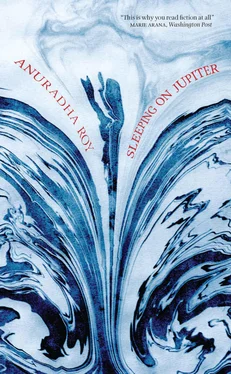The new man’s name was Jugnu. He had a thin face and long arms and he walked like a monkey, with his shoulders drooping. His nose was twisted to one side. His neck had a scar that looked like wrinkled pink satin. He too had come by boat and his hair stood on end as if the sea breeze had never gone out of it. He lived in a corner of the garden shed that he had made his own, with a mat to sleep on and a stove on which he brewed sweet tea. He was known to be very devout. He sang hymns and was often found sitting in the ashram’s puja hall as if in a trance. Usually, though, he was hunched over plants. His hands were scaly and big, the fingers looked like knots in a tree trunk, but when they went into soil they were so careful that he never broke the frailest, finest hair from the roots. After he came, the ashram started to look prettier and smelled sweet everywhere, especially in the evenings when the night flowers bloomed. He was devoted to Guruji and planted beautiful flowers all around his cottage.
During the morning the ashram was such a busy, bright place that I don’t think anyone looking around would have known that there were twelve girls in it who had nobody. Everyone came to hear Guruji’s discourses at the big audience hall. Holy men came from other ashrams to listen to him. I saw so many monks I could not tell one from the other. They all looked the same: long hair and yellow robes. Then there were our teachers, a cook, and Jugnu. In the afternoon the visitors left. The students who came from outside went off in their buses. The boys in our school went back in a van to their dormitory, which was in another building, far away. The teachers who did not belong to the ashram went home. The monks from the visitors’ side of the ashram returned to their cottages across the fence. We were by ourselves then.
When school was over and everyone was gone, I had to work in the garden for two hours. I don’t remember much about what I did for those two hours, but one such afternoon was so strange I can’t forget it. Jugnu had told me to fork the earth below Guruji’s window. I was doing that when I heard sounds from inside: grunting sounds, whimpering sounds, screaming, which stopped abruptly, the sound of something banging and thumping. Suddenly Champa shot out of the house. I dropped down behind the bush. I heard a man’s voice: “You wait and see. See what happens.” I could not tell whose voice it was, but it frightened me so I stayed behind the bush for a long while, being bitten by insects.
Champa was a favourite of Guruji’s. She had her own room like all the older girls. Her bed had a striped bedspread and she had a vase for flowers and a picture of Guruji on the wall. The other older girls had none of these things. She used to worship the picture and light incense in front of it. I thought when I grew older I would have a room like that.
Champa was the only one among the boat girls who had a few things from long ago and these were never taken away from her. She kept her things in a brick-sized aluminium box with a clasp. A little lock went through the clasp. Nobody had ever seen the box unlocked. We did not know what was in it. In the evening of the day I overheard her screaming, Bhola made a fire in the quadrangle outside our dormitory. He was one of Guruji’s trusted helpers and he had been at the ashram right from when the war started. Guruji had found him half dead and brought him back to life: it was one of the miracles he was famous for.
Bhola broke open the lock on Champa’s box with a sharp rap of a stone. He picked something out and held it between two fingertips as if it were filthy. “A duster? A hanky?” he said. “Whose? Your father’s?” Champa did not answer.
The heat from the fire in that warm evening made sweat pour down Bhola’s pitted face. A bomb had left one side of him maimed. He hobbled to Champa with the rag. “What is this cloth? Give me an answer and nothing will happen to it,” he hissed at her. Now I know he must have relished every second of being a villain who bared his fangs and growled to scare little girls, but at that time there was nobody more terrifying or cruel even in our nightmares.
I do not remember the exact sequence of the things that happened next — that evening is a series of dark images in my head. I think Champa mumbled something and Bhola tossed the cloth into the fire. He picked up a photograph from the box. “What an ugly fat woman,” he said. After the photograph had sizzled to ashes he picked out a tiny doll. Its head lolled and its arms were limp and it wore a printed rag as a sari. When she saw that doll, something happened to Champa. She made a choking sound as if she would vomit and she turned away to run into the dormitory. Savita-di, our matron, held her back by her arm. “You can leave when Guruji tells you to, not before,” she said.
It was only then that I noticed him in the shadows, watching everything. Guruji stood as expressionless as when he had caught me on the pomegranate tree. Champa was crying, “I won’t run away again, I will never run away again.” He said nothing. We did not know Champa had tried running away. We had been told never to leave the ashram. We knew if any of us was caught outside, every other boat girl would be in danger. We thought: if she ran away she deserves punishment. How just Guruji is, he punishes even his favourite.
After all the things in the box were burned, we were told to go back to our rooms and dormitories while Champa was led away to Guruji’s cottage for an audience with him.
Not many days after that it was my turn. I had been hiding between the bushes and trees in a complicated game with Piku, and before we knew it we had drifted to the outer boundary of the grounds. There was high barbed-wire fencing. Beyond the fences were rows of cottages and parks. It was the visitors’ part of the ashram. I had only glimpsed it before from high up in the pomegranate tree. Now we could see men and women sitting at meditation. Many were just like us and some were foreigners with light hair.
If we had stayed quiet we would have got away with it. But Piku tried to make one of the foreigners notice her by standing up and shouting. She could be so stupid. The man turned. He was tall, with yellow robes, and he had a long beard and long hair and held prayer beads. I have never forgotten his face because he was young, but his hair was snow-white, his eyelashes were white, and his eyes seemed white too. He looked around, trying to find where the shouts had come from. I pulled Piku to the ground and behind the bushes. I knew there would be trouble if we were spotted. I led her away through the grass at a crawl. I thought we had made it. Then we heard a snuffling and growling and there, behind us, was Bhola and with him on a chain was one of the dogs that roamed the ashram’s grounds at night.
Bhola’s teeth were yellow and red because he chewed tobacco all day. Below his shirt he wore a lungi. Seeing us at the boundary he dropped the dog’s chain to the ground as if he had forgotten there was a fierce animal at the end of it. He only stepped on its chain at the last instant, when the dog was very close to us. He rolled his lungi to his knees and put his hands on his hips. One of his hands held a bamboo switch.
“So, shall I let him go?” he said. He said many more things, but for some reason this is what I recall. Maybe I thought I would be eaten alive by that dog.
Piku was smiling at Bhola, showing all her teeth. As if smiling would get us out of trouble. Bhola picked up the dog’s chain and poked her with his freed foot. He said, “Hey, nothing to smile about, you dolt. Nothing at all.”
I think of myself then, standing up very straight, hands on my waist, daring him to do his worst, saying, “We haven’t done anything, you can’t hurt us.” Was I really so brave? My head must have been just about level with his waist. My hair was still in two plaits. I knew that only a fortnight had passed since Bhola burnt all Champa’s things. I didn’t care. I had no box full of things for him to burn.
Читать дальше












